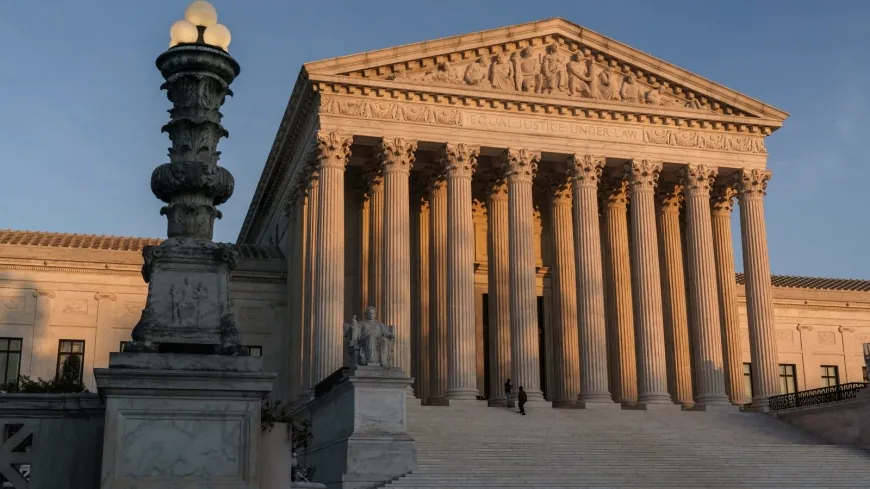US Supreme Court allows Virginia’s voter purge program to resume

WASHINGTON (WRIC) – The U.S. Supreme Court granted Virginia’s last-ditch effort to keep about 1,600 people off its voter rolls that Republican state officials claim are noncitizens and continue canceling registrations of those suspected of being noncitizens.
In a 6-3 decision on Wednesday, the high court granted Virginia's emergency stay to block a federal judge's order requiring it to restore the registrations of roughly 1,600 people who state officials have said are noncitizens and halt a recently changed program aimed at purging noncitizens from voter rolls.
The Supreme Court's six conservative judges ruled in favor of Virginia and the three liberal justices dissented. Republican Gov. Glenn Youngkin praised the decision, calling it "a victory for commonsense and election fairness."
"I am grateful for the work of Attorney General Jason Miyares on this critical fight to protect the fundamental rights of U.S. citizens," Gov. Youngkin said in a statement. "Clean voter rolls are one important part of a comprehensive approach we are taking to ensure the fairness of our elections."
The federal judge who oversaw the case and the federal appeals court cast doubt on Virginia state officials' claims that all people removed from the voter rolls were noncitizens. And media outlets have found Virginians eligible to vote who had their registrations incorrectly canceled.
The immigrant rights and voting rights groups who filed a lawsuit against Virginia over the program -- the Justice Department also sued -- said they are “disappointed and alarmed” over the decision, calling the ruling “misguided.”
READ MORE: Virginia asks US Supreme Court to block order to reverse voter purge
“Voting is a sacred privilege only afforded to U.S. citizens. Governor Youngkin and Attorney General Miyares’s efforts to target naturalized citizen voters yielded the disenfranchisement of both natural born citizens and naturalized citizens,” Monica Sarmiento, executive director of the Virginia Coalition for Immigrant Rights, one of the groups, said in a statement.
The case reached the high court after a federal appeals court had upheld the federal judge’s order requiring Virginia to reverse the voter removals and temporarily stop a program to keep noncitizens off voter rolls that was adjusted under an executive order from Youngkin on Aug. 7.
On Monday, Virginia officials filed an emergency appeal with the Supreme Court to allow the commonwealth to resume its voter purge program and keep the roughly 1,600 registrations canceled since Gov. Youngkin's order from being restored.
U.S. District Judge Patricia Tolliver Giles, who was nominated to the court by President Joe Biden (D), had agreed with the Justice Department and groups that sued over the adjusted purge process under Youngkin's order, arguing the removals came too close to Election Day in violation of federal law.
The law — the National Voter Registration Act — requires Virginia and other states to stop systematically removing the names of ineligible voters from the rolls within 90 days of the election, known as a “quiet period,” to avoid errors that could take eligible voters off the rolls.
Gov. Youngkin’s office had argued his Aug. 7 order requiring daily updates to voter lists to remove ineligible voters – which came 90 days before the Nov. 5 election – doesn’t violate the law and enforces a 2006 state law signed by Virginia’s then-Democratic Gov. Tim Kaine.
Judge Giles found Virginia’s system was systematic, not on an individual basis as Youngkin’s administration has contended, and ordered Virginia to reinstate those removed during the 90-day quiet period to the voter rolls.
Youngkin and other state GOP officials criticized the judge’s ruling, some, including Miyares, accusing the Justice Department of being politically motivated in its lawsuit and trying to force Virginia to reinstate noncitizens to the voter rolls.
“Let’s be clear about what just happened: only eleven days before a Presidential election, a federal judge ordered Virginia to reinstate over 1,500 individuals–who self-identified themselves as noncitizens–back onto the voter rolls,” Youngkin said in a statement.
But Giles and the federal appeals court panel that upheld her order raised doubts about Virginia’s claims that the voter registrations canceled were all noncitizens, finding that the state provided no proof to show this was the case.
“Appellants err in asserting that the district court ordered them to ‘restore approximately 1,600 noncitizens to the voter rolls,’” the appeals court ruling read. “What the district court actually found was that ‘neither the Court nor the parties . . . know’ that the people ‘removed from’ the voter rolls under the challenged program ‘were, in fact, noncitizens,’ and that at least some ‘eligible citizens . . . have had their registrations canceled and were unaware that this was even so.’”
The groups that sued have said that eligible voters were incorrectly removed under the program, submitting court filings that contend that at least three citizens had their registrations canceled.
Also, media outlets have found Virginians who are citizens have had their registrations canceled after Youngkin’s order.
Under the executive order from Youngkin, the lawsuits say the DMV sends the state’s elections department a daily list of Virginians who answered “no” to a citizenship question on paperwork or have legal presence documents indicating non-citizenship status.
Youngkin’s executive order notes that local registrars notify those identified as noncitizens of their pending registration cancellation unless they confirm their citizenship within 14 days. Data from a few registrars obtained by 8News shows that eligible voters were removed from the rolls.
Giles wrote in her order that it wouldn't stop Virginia’s authority to cancel voter registrations of noncitizens through individualized review or its ability to investigate noncitizens who may have tried to register. “The preliminary injunction applies only to Defendants’ systematic Program which occurred after August 7, 2024,” Giles wrote.
This story is breaking. Stay with 8News for updates.

 VENN
VENN 





